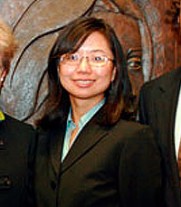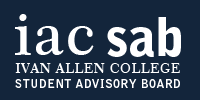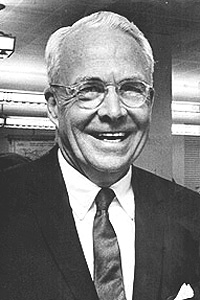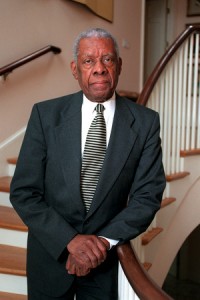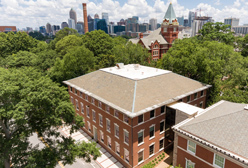New Sponsored Research
Mike Best, associate professor in The Sam Nunn School of International Affairs, has been awarded $150,000 by the U.S. Trade and Development Agency (USTDA) for the project "Ghana: Technical Assistance For Branchless Banking."
New Faculty Books
10 PRINT CHR$(205.5+RND(1)); : GOTO 10 (MIT Press) by Nick Montfort, Ian Bogost, professor in the School of Literature, Media, and Communication, and additional authors. This book takes a single line of code--the extremely concise BASIC program for the Commodore 64 inscribed in the title--and uses it as a lens through which to consider the phenomenon of creative computing and the way computer programs exist in culture.
Portrait critique de la Russie: Essais sur la société gothique (Putin’s Russia: Essays on Gothic Society) (Eds. De l’Aube) by Dina Khapaeva, professor and chair of the School of Modern Languages. This is a French translation and expansion of the Russian version published in 2007, which analyzes recent events in Russia, Vladimir Putin's reelection and its relation to politics and the Russian people.
What Does Georgia Tech Think?
Selected Press for Ivan Allen College of Liberal Arts
|
Paul Baer on the Review Process for IPCC Climate Reports
“There is an alternative, web-based model, in which participation is open – at least at some level – but in which opinions have to be justified, and evaluation is done by weighting opinions...The process would separate the development of expert opinion on a particular question (how likely is it really that X?) from the overall assessment process; a single “finding” would be more like a Wikipedia page. It would not replace the Intergovernmental Panel on Climate Change's process entirely, but it would offer a great deal more transparency to the subjective probability judgments that are the flashpoint for these debates. (Baer is an assistant professor in the School of Public Policy.) Source: New York Times Dot Earth, December 13, 2012
Boston on Small Businesses and the Fiscal Cliff
A Georgia Institute of Technology professor, Thomas Boston (School of Economics), said the fiscal cliff could do enough damage to small businesses to halt the economic recovery. ‘‘They’re just now recovering, really growing in any kind of significant way since the recession,’’ Boston said. ‘‘The job creation we’ve seen over the last five months, that creation has been located overwhelmingly in small businesses.’’ Source: Boston Globe, December 13, 2012
Bogost on Video Games as Art
“Forget games; art doesn’t have any sort of stable meaning in contemporary culture anyway,” writes Ian Bogost, professor in the School of Literature, Media, and Communication, in his book How to Do Things with Videogames (University of Minnesota Press, 2011). Source: Wall Street Journal, November 30, 2012
Stulberg on the Fiscal Cliff
Adam Stulberg, co-director of the Center for International Strategy, Technology, and Policy at Georgia Tech, said the idea was to make the consequences of doing nothing so great that Congress and the president would have to act. "Our politicians have not really understood the game of chicken very well," he said. Source: Philadelphia Daily News, November 8, 2012
Brown on Biodiesel Recycling
"I think that the supply [of biodiesel] is limited. It's never going to grow to more than a small percentage of our transportation fuels," said Marilyn Brown, professor in the School of Public Policy. Source: NBC 11 Alive, November 26, 2012
Bogost on the Lytro Camera's Impact on Photography
"As a photographic format, the light field camera doesn't really upset or replace Cartier-Bresson's foundational observation about photographic practice: Making still images is a process of finding the right moment to hold still forever. There are more and less decisive images, but every photograph must contend with the crisis of choosing such a moment, whether by intention or chance," writes Ian Bogost professor in the School of Literature, Media, and Communication. Source: The Atlantic, December 3, 2012
Bankoff on the Influence of Art and Culture
Speaking at a recent Rotary Club meeting, Joe Bankoff, chair of The Sam Nunn School of International Affairs, asked the 200 club members "to stand if they had participated in some form of arts activity in their youth like music, dance, painting, or theater: nearly every person present stood up. He then asked those standing if they made a living today in an arts-related field and nearly everyone standing sat down. The point drove home the positive influence of arts and culture on the lives of so many of us." Source: Atlanta Business Chronicle, November 23, 2012
Laband on Thanksgiving Day Shopping
Do Americans need to shop on Thanksgiving? David Laband (chair of the School of Economics) likes to pose this question at such debates: "Why is it that we really have to use the strong arm of the power of government to enforce behavior?" Clearly, some segment of the population wants to shop on Thanksgiving. And bricks-and-mortar stores are now competing with online retail options that are open 24 hours a day."There's this sort of relentless market pressure telling everybody that people want to be able to shop on Sunday or at midnight." Source: Tech News, November 21, 2012
February 22, 2013
8:00 pm
|
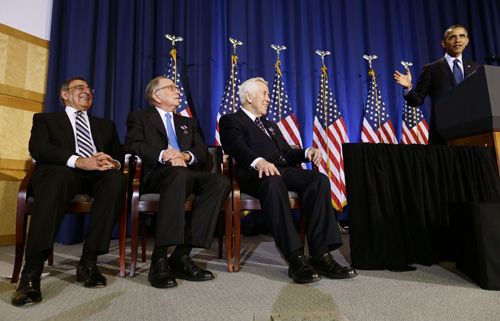
|
Nunn Receives Top Defense Department Award
President Barack Obama joined with the U.S. Department of Defense to honor former U.S. Senator Sam Nunn, distinguished professor in The Sam Nunn School of International Affairs, at a ceremony during the day-long Nunn-Lugar Cooperative Threat Reduction Symposium held in Washington, D.C., on December 3.
Senators Nunn and Richard Lugar were presented with the Medal for Distinguished Public Service, the Defense Department's highest civilian honor. The President called the CTR program "one of the country’s smartest and most successful national security programs."
“No one’s done more than the two visionaries on this stage,” said Obama. “Missile by missile, warhead by warhead, shell by shell, we’re putting a bygone era behind us. Inspired by Sam Nunn and Dick Lugar, we’re moving closer to the future we seek. A future where these weapons never threaten our children again."
During its 20-year history, the CTR program is credited with effecting deactivation of more than 7,600 nuclear warheads and safeguarding nuclear weaponry during the political upheaval generated during the 1991 collapse of the Soviet Union. The program is set to expire this spring.
“I could not be prouder of these gentlemen and I’m proud to call them friends,” said Obama. “When I was … elected to the Senate, Sam Nunn was one of the first leaders I called. Obviously, he had an extraordinary reputation for his work on a whole range of issues in the Senate...and as president, I continue to value his advice and his counsel.
"We can say that the course of history changed for the better because these two men helped the nation confront the threat of nuclear proliferation at the end of the Cold War," said Defense Secretary Leon Panetta during the ceremony. "The world would have been, without question, a far more dangerous and threatening place were it not for these two patriots."
Photo: Senator Nunn is seated with Leon Panetta (left) and Senator Lugar (right) as President Obama made his remarks.
Related Links
|
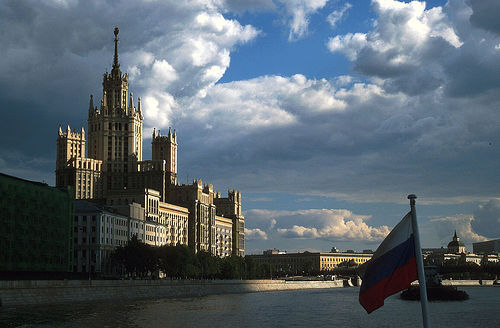
|
Post-Soviet Gothic Society: A Trend Toward Post-Humanism?
In 2007, Dina Khapaeva published Putin’s Russia: Essays on Gothic Society in her native Russian language. A recently published French translation of the book, "Portrait critique de la Russie: Essais sur la société gothique" (Eds. De l’Aube, 2012), has provided the School of Modern Languages chair an opportunity to expand upon these perspectives about her homeland.
Gothic Society is the verdict that Khapaeva articulates for Putin’s Russia, but also believes is a lens for Western culture.
According to Khapaeva, contemporary Russian society, which is often compared with an early feudalism and with Soviet rule, should actually be understood as a society of a new type. An analysis of Russian politics, public discourse, and literary texts demonstrates that the novelty of the post-Soviet regime resides in the new role criminal culture plays in society. The rules of zona, a Soviet concentration camp and prison, are becoming a matrix for social relations. A further novelty consists of an emerging system of values that is transforming human relations and attitudes about humanity.
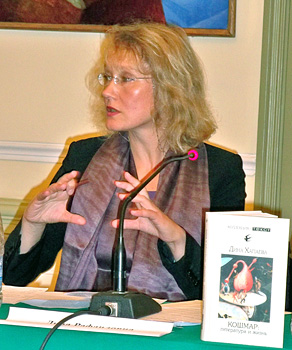 In her book, Khapaeva investigates the reasons for this transformation, which she says cannot be explained solely by the unprecedented level of corruption present in today’s Russia. In her book, Khapaeva investigates the reasons for this transformation, which she says cannot be explained solely by the unprecedented level of corruption present in today’s Russia.
"The politics of memory" that has been conducted by Putin’s regime since the 2000s is one explanation. The politics of memory has nurtured a "selective historical amnesia," an unwillingness of post-Soviet Russians to acknowledge their historical responsibility for crimes committed under the Soviet rule. The dominant narrative presents Soviet history as the national glorious past based upon victory in the ‘"Great Patriotic War" (1941-1945). This has served as a powerful mythmaking tool for rehabilitating Stalinism and preventing critical reflection on this regime.
Khapaeva constructs her argument through analysis of post-Soviet fiction and films. She says that the post-Soviet era has given rise to Gothic Aesthetics, which damage moral norms and social relations. The Russian example demonstrates how the suppressed memory of the Soviet terror fuels a cult of force and the idolization in fiction and movies of nonhuman monsters that triumph over human kind. The relations of monsters to humans in these narratives reproduce the mores of concentration camps and their contempt for culture and civilization, as well as, humanistic values.
Gothic Aesthetics are not solely a Russian phenomenon. It is an international trend in novels and visual arts. Two features characterize Gothic Aesthetics. First, a nonhuman monster—a vampire, a werewolf—represents an aesthetic ideal and holds the empathetic role of main protagonist and first person narrator, roles that were previously reserved for humans. Humans are reduced to food and prey or passive objects of subjugation. This represents a major shift in attitudes and perceptions about the place and role of humanity.
The second feature of Gothic Aesthetics are plots that are designed to immerse the audience in nightmarish trance. Vampire sagas such as Twilight, or The Vampire Dairies, or thrillers such as the new Hollywood version of Snow White and the Huntsman illustrate this trend. The public is rapidly becoming addicted to these man-made nightmares which create a culture of nightmare consumption.
Gothic Aesthetics are further coupled with medieval allusions that are now widely used to interpret the political and social spheres in Europe and the US. Even in democratic countries where Gothic Aesthetics have not yet managed to impact society to the extent that it has in Russia, the Post-Soviet case presages a trend on the horizon. Gothic Aesthetics signify radical dehumanization, not of a particular social or ethnic group, but of humanity in general. The historical memory of the twentieth century catastrophes in Europe and the U.S. amplifies its effects and indicates a deep disappointment with human culture and civilization. Gothic Aesthetics offer an alarming diagnosis of contemporary conditions.
Khapaeva is chair and professor in the School of Modern Languages, Ivan Allen College of Liberal Arts, Georgia Tech. She is the author of five books. Her newest book in English is Nightmare: From Literary Experiments to Cultural Project (Brill, 2012).
|
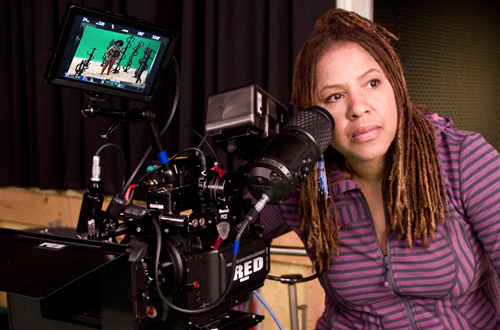
|
What Does Your Stuff Say About You? Chenzira at TEDxPeachtree
The pincushion beckoned. As Ayoka Chenzira dusted off shelves and boxed up the clothes in the house of her recently deceased mother, she stopped to contemplate the tomato-shaped hallmark of sewing kits.
 “Suddenly I realized that this pincushion that had been with my mother since before I was born probably knew a lot about her. I could only imagine what stories it had to tell,” said Chenzira. “I knew that there had to be a way to pull the memories from objects.” “Suddenly I realized that this pincushion that had been with my mother since before I was born probably knew a lot about her. I could only imagine what stories it had to tell,” said Chenzira. “I knew that there had to be a way to pull the memories from objects.”
The experience with her mother’s pincushion was a touchstone for exploring the communicative ability of our belongings, the theme Chenzira highlighted during the TEDx Peachtree 2012 conference, held November 2 in the Buckhead Theatre. She also reflected on her time in the Digital Media (DM) program, where she designed interactive table tops, such as one honoring her mother (pictured left), that enable the physical items in our lives to share their memories.
“While I am very drawn to experimenting with technologies, my work is grounded in the humanities – questions around what it means to ‘be’ in the world. I am less interested in the ‘Oh wow!’ factor of human-computer interaction and more concerned with how technologies can deepen our sense of humanity,” said Chenzira. “Through my DM experience, I learned that I could get closer to reproducing the many worlds in my imagination, many of which require an intimate collaboration between the arts and sciences.”
Related Links
|
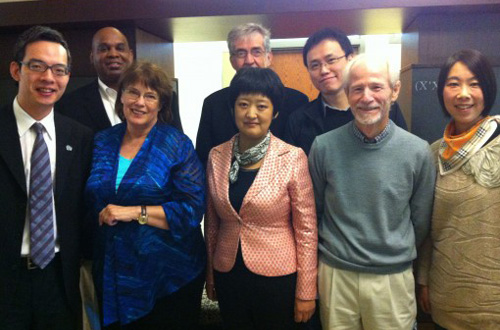
|
Chinese Bank Leaders Visit School of Economics
Executives from China's banking industry visited the School of Economics in November as a part of the U.S. Department of State's International Visitor Leadership Program.
The program is designed to facilitate intercultural idea exchange through citizen diplomats. Christine Ries, professor in the School of Economics, led a discussion on tax reform, banking regulations, current events, and politics. Participants included Professors Patrick McCarthy and Willie Belton, and Jim Verbrugge, a University of Georgia professor of business. The discussions at Georgia Tech were part of a series that included similar dialogs in Washington, D.C., New York, St. Louis, and San Francisco.
|
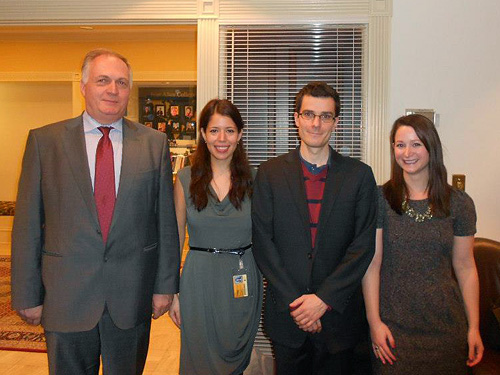
|
German and French Consul Representatives Discuss Transatlantic Diplomacy
Pictured from left to right: Dr. Alfred Schlicht, Moraima Guzman-Bambaren, David Kibler, and Katie Klatt.
The International Affairs Graduate Organization (INTAGO) hosted a consular panel discussion on the role of diplomacy in the transatlantic relationship and world politics on November 29. Alfred Schlicht, Deputy Consul General of Germany, and David Kibler, Cultural Attaché to the French Consulate, were the distinguished guests. INTAG President Katie Klatt served as the moderator.
Discussion topics included the importance of diplomats in international affairs, the dangers of diplomacy, the changing nature of the European Union, and inter-consular coordination. Schlicht and Kibler shared insights about their diplomatic experiences and offered European perspectives on current events in international affairs and on the relationship with America.
|
Wang Receives EPA STAR Fellowship
Joy Wang, a doctoral student in the School of Public Policy, has received a $126,000 Science to Achieve Results (STAR) Fellowship from the U.S. Environmental Protection Agency (EPA).
Advised by Professor Marilyn Brown, Wang's dissertation will examine the impact of information, such as that provided by smart meters, on consumer behavior and energy use.
The EPA STAR Fellowship is a highly competitive program that supports those pursuing advanced degree in environmental studies and other fields such as social anthropology, urban and regional planning, and decision sciences.
|
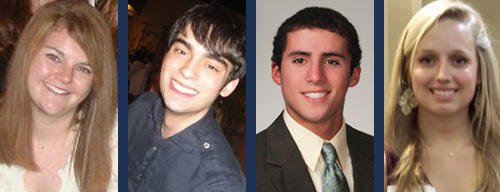
|
SPP Students Awarded D.C. Internship Stipends
Four undergraduates in the School of Public Policy have received summer stipends through the Georgia Tech D.C. Internship Program.
They are (pictured from left to right):
- Gwendolyn Hughes, Public Policy
- Jordan Lockwood, Public Policy/Business
- Jason Lupuloff, Public Policy/ISYE
- Mary Shoemaker, Public Policy
Each student was awarded $5,000 to support a 10-week internship with members of congress, congressional committees, or executive branch offices, which are secured with the assistance of the Division of Professional Practice (DoPP) and the Office of Government and Community Relations.
Related Links
|
Student Advisory Board Announces New Members
The Ivan Allen College Student Advisory Board announced eight new members. They are:
- Caroline Gwynn, STAC major
- Danielle Sharp, HTS major
- Elizabeth Clark, majoring in ALIS and GEML
- Johnna Sheu, GEML major
- Laura Margaret Burbach, PUBP major
- Rose Anthony, INTA major
- Lauren Foley, ECON major
- Jason Lupuloff, majoring in PUBP and ISyE
The SAB expressed their appreciation for the service rendered by departing members, especially Michael Tallini (PUBP) and Nancy Thanki (STAC) who have been active in SAB throughout their undergraduate years.
|
Connecting Across the College
The College welcomed members of our IAC family to some special celebrations this fall. Spring promises a renewal of our annual Founder's Day celebration and, later in spring, the awarding of the Ivan Allen Jr. Prize for Social Courage. Read on so that you can save the dates!
|
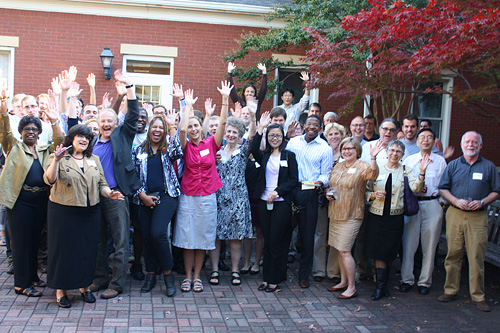
|
Graduate Student Reception
Students and alumni of IAC master's and doctoral programs, faculty, and administrators gathered for a special reception at Habersham Building on Homecoming Friday, October 26th. Hosted by Dean Jacqueline Jones Royster and Associate Dean for Graduate Studies Carol Colatrella, the program included presentations by IAC graduate program alums who shared their experiences and advice. They included:
- Ayoka Chenzira, Ph.D. in Digital Media, 2010, an award-winning filmmaker, animator, and artist who is noted for being the first African-American female to produce work and teach in the digital arts. She is a faculty member at Spelman College.
- Dan Grigoras, M.S. in Economics, 2010, currently a healthcare consulting professional with Huron Consulting Group.
- Travis Horsley, Public Policy master's candidate, currently Director of External Affair for TOHL, Inc. a for-profit U.S. based entity that implements non-traditional industrial infrastructure.
- Haven Hawley, M.S. in History of Technology 2001, and Ph.D., History and Sociology of Technology 2005, currently is Director of the Immigration History Research Center at the University of Minnesota.
- Alison Nichols, M.S. in Information Design and Technology (now Digital Media), 1995. Previously an Associate Partner with IBM Interactive and currently the Associate Director of Graduate Studies in Digital Media
- Leslie Sharp, M.S. in History of Technology, 2001 and Ph.D. in History of Technology, 2004, has been Assistant Dean for Academic Affairs and Outreach in the College of Architecture and begins as Assistant Vice Provost for Graduate Education and Faculty Affairs for Georgia Tech in 2013.
- Valentin Todorov, M.S.in Economics, 2007, currently is Senior Statistician at Assurant Specialty Property.
|
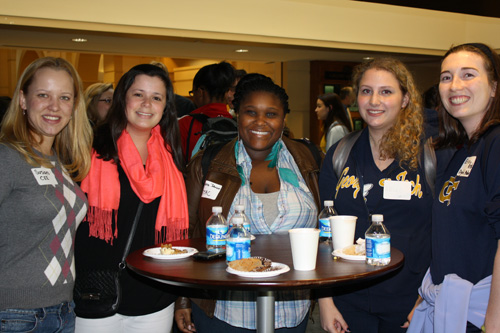
|
Ivan Allen College Rejuvenation Station
More than 130 students, faculty, and staff in the Ivan Allen College of Liberal Arts turned out for our first college-wide fall event, held on November 28, 2012 in the Bill Moore Student Success Center.
Attendees enjoyed hot cocoa, popcorn, and cupcakes and played IAC Ten Questions Trivia. It was a fun opportunity to mix and mingle. View the photo album on Facebook.
|
Save the Dates for IAC Spring Events
The 12th Annual Ivan Allen College of Liberal Arts Founder's Day celebration will take place on March 13th. Details about a new and different Founder's Day program will be coming your way soon, so save the date!
The Ivan Allen Jr. Prize for Social Courage will be awarded by the Institute and IAC during events that will be held April 4th. There will be a morning symposium and an afternoon awards luncheon.
We look forward to having you join us for these special events!
Related Links
|
Civil Rights Activist Jesse Hill Jr. Dies
Jesse Hill Jr., an Atlanta business executive and civic leader who was honored by the college as the recipient of the 2006 Ivan Allen Prize for Progress and Service, died Monday, December 17, at age 86.
A contemporary of Ivan Allen Jr., Hill’s influence and leadership extended across the business, civic, and social realms, both locally and nationally. During the civil rights era, his counsel, support, and ability to generate funds were crucial to building credibility for the movement. He was a driving force behind African-American voter registration initiatives and the desegregation of the Atlanta Public Schools and the University System of Georgia. He broke barriers as the first black president of the Metro Atlanta Chamber of Commerce and the first black member of the USG Board of Regents.
Hill never held public office, but his resume included the chairmanship of the Atlanta Life Insurance Company, the presidency of the Atlanta Chamber of Commerce, and as the founding publisher of the Atlanta Inquirer newspaper which served the African American community. He counseled Georgia civic leaders ranging from Martin Luther King Jr. and Jimmy Carter to Mayors Maynard Jackson, Sam Massell, and Kasim Reed.
Similar to his contemporary, college namesake, Ivan Allen Jr., Hill held a deep affection for Atlanta and was an untiring advocate and transformational influence on Atlanta social and civic affairs.
AJC Announcement
Washington Post Announcement
Photos from 2006 IAC Founder’s Day honoring Mr. Hill
|
|











 In her book, Khapaeva investigates the reasons for this transformation, which she says cannot be explained solely by the unprecedented level of corruption present in today’s Russia.
In her book, Khapaeva investigates the reasons for this transformation, which she says cannot be explained solely by the unprecedented level of corruption present in today’s Russia.
 “Suddenly I realized that this pincushion that had been with my mother since before I was born probably knew a lot about her. I could only imagine what stories it had to tell,” said Chenzira. “I knew that there had to be a way to pull the memories from objects.”
“Suddenly I realized that this pincushion that had been with my mother since before I was born probably knew a lot about her. I could only imagine what stories it had to tell,” said Chenzira. “I knew that there had to be a way to pull the memories from objects.”

